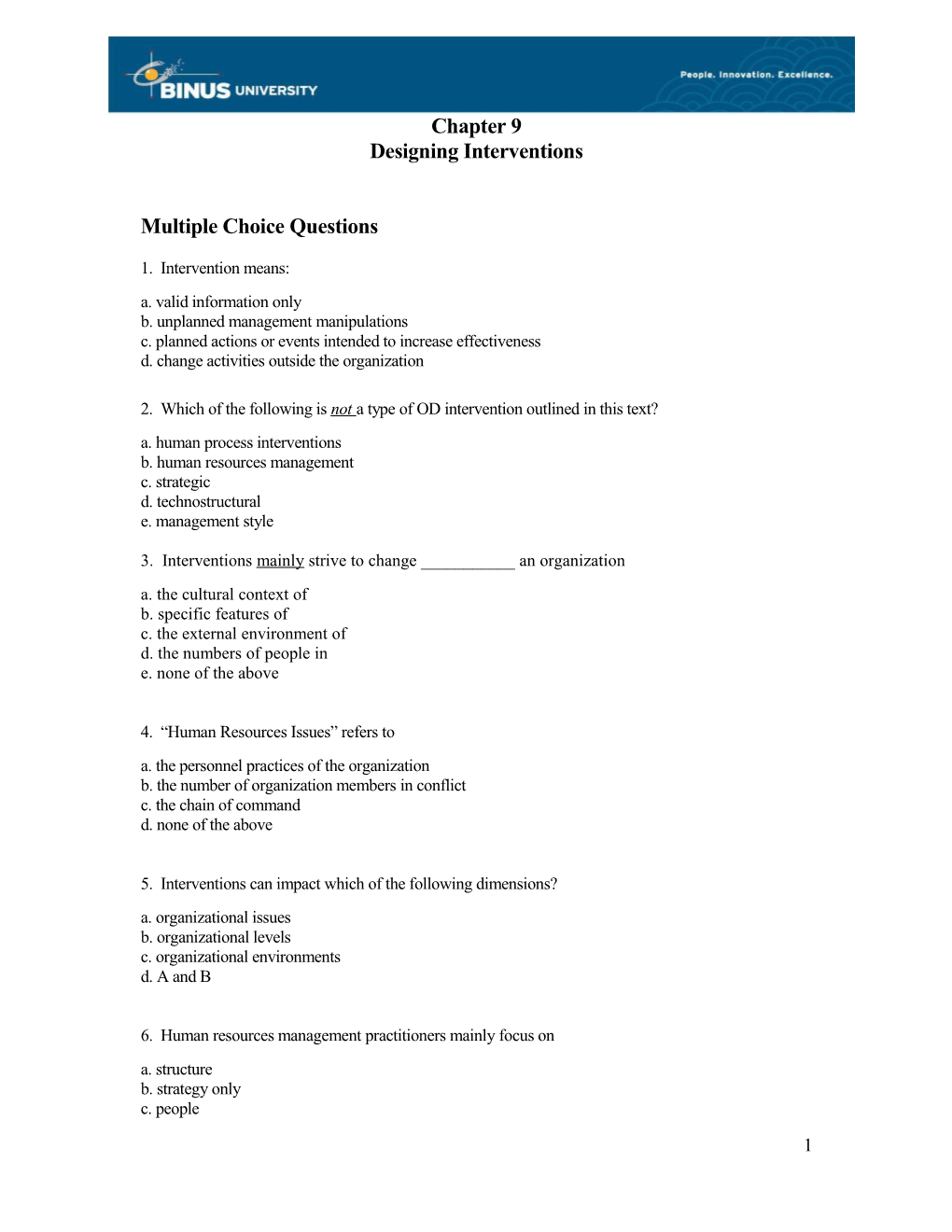Chapter 9
Designing Interventions
Multiple Choice Questions
1. Intervention means:
a. valid information only
b. unplanned management manipulations
c. planned actions or events intended to increase effectiveness
d. change activities outside the organization
2. Which of the following is not a type of OD intervention outlined in this text?
a. human process interventions
b. human resources management
c. strategic
d. technostructural
e. management style
3. Interventions mainly strive to change ______an organization
a. the cultural context of
b. specific features of
c. the external environment of
d. the numbers of people in
e. none of the above
4. “Human Resources Issues” refers to
a. the personnel practices of the organization
b. the number of organization members in conflict
c. the chain of command
d. none of the above
5. Interventions can impact which of the following dimensions?
a. organizational issues
b. organizational levels
c. organizational environments
d. A and B
6. Human resources management practitioners mainly focus on
a. structure
b. strategy only
c. people
d. information systems
7. Reward systems are best described as
a. ways to improve employee satisfaction
b. innovative approaches to pay, promotions, and fringe benefits
c. none of the above
d. both A and B
8. Which of the following is a “strategic” issue that might affect an intervention?
a. an impending acquisition
b. an antiquated performance management system
c. a workgroup’s decision making process
d. none of the above
9. Which of the following best describes technostructural interventions?
a. changing the high-tech areas within the organization
b. helping organizations decide on markets, products or services
c. changing job design and division of labor
d. none of the above
10. Key questions to ask when deciding the appropriate intervention method are
a. Have the issues been accurately diagnosed?
b. Are change methods appropriate to the organizational issues identified in diagnosis?
c. Can skills to implement the intervention be transferred to organizational members?
d. A and C
e. A, B, and C
11. Which of the following is/are true about strategic interventions?
a. link internal functioning with the larger environment
b. among the newest additions to organization development
c. focus on strategic choices to gain competitive advantage
d. all of the above
12. Which of the following are true about interventions?
a. They are derived from strong “causal” relationships.
b. Only a few interventions have been subject to evaluative research.
c. They always have great impact of some sort on organizational functioning.
d. none of the above
True/False Questions
13. Relevant interventions do not need acceptance or ownership from organization members.
14. Quality of work life encompasses more than just the work environment.
15. Work design gets at the issue of job enrichment via greater task variety, autonomy, and feedback results.
16. The key intervention implementation issue underlying all OD interventions is the need to tailor them to fit the organization.
17. The need to tailor interventions suggests that applications of the same intervention are often identical.
18. Organization learning is a strategic intervention for transforming organizations.
Essay Questions
19. Explain what an “intervention” is and how it fits into the organizational development process. What are the key considerations when deciding on an intervention?
20. Discuss the four major types of interventions including descriptions of specific interventions within each main category.
21. Contrast employee involvement and quality of work life with organization development.
3
